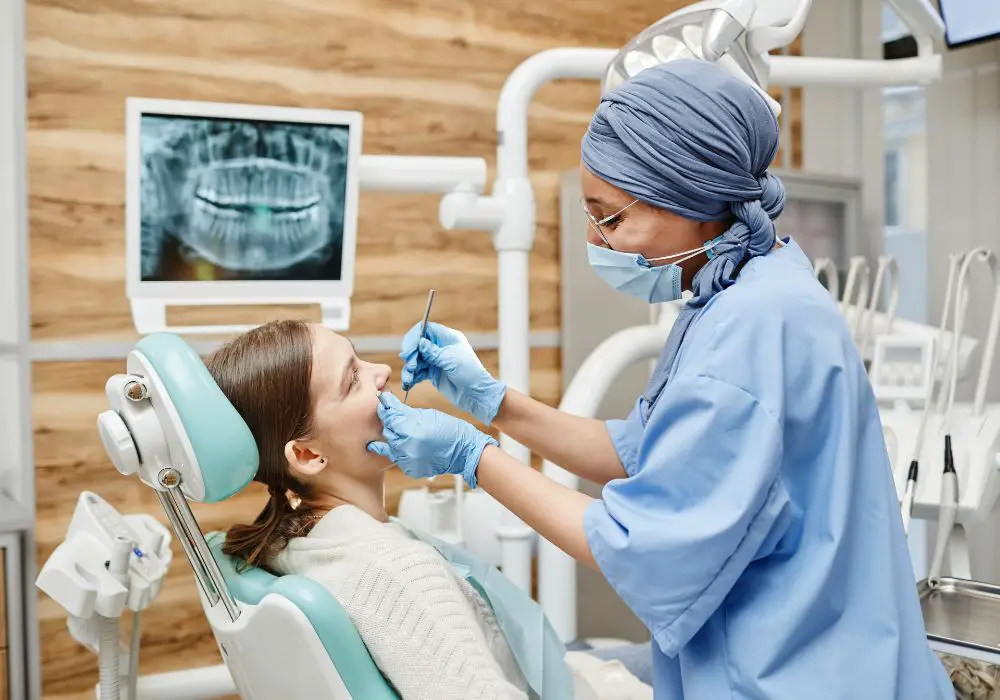Are you concerned about getting a crown on your tooth? Crowns are often used to restore teeth that are damaged or decayed, but they can be expensive and time-consuming to get. Fortunately, there are steps you can take to prevent the need for a crown in the first place.
One way to avoid getting a crown is to practice good oral hygiene. Brush and floss your teeth regularly to prevent cavities and gum disease, which can lead to the need for a crown. It’s also important to visit your dentist for regular cleanings and checkups, as they can catch any potential issues early on and prevent them from getting worse.
Another way to prevent the need for a crown is to be mindful of your diet. Sugary and acidic foods and drinks can erode your tooth enamel and increase your risk of cavities. Try to limit your intake of these items and instead opt for healthier options like fruits, vegetables, and dairy products. By taking these steps, you can help keep your teeth healthy and strong and avoid the need for a crown.
Understanding Tooth Decay
Tooth decay is a common dental problem that affects people of all ages. It occurs when the bacteria in your mouth produce acid that erodes the enamel on your teeth, leading to cavities and other dental issues. In this section, you will learn about the causes and symptoms of tooth decay, which will help you prevent the need for a crown on your tooth.
Causes of Tooth Decay
Tooth decay is caused by a combination of factors, including poor oral hygiene, a diet high in sugar and carbohydrates, and a lack of fluoride. When you eat sugary or starchy foods, the bacteria in your mouth produce acid that attacks the enamel on your teeth. Over time, this acid can cause a cavity to form, which can lead to more serious dental problems.
Symptoms of Tooth Decay
The symptoms of tooth decay can vary depending on the severity of the condition. In the early stages, you may not experience any symptoms at all. As the decay progresses, however, you may notice the following:
- Tooth sensitivity to hot or cold temperatures
- Pain when biting down or chewing
- Visible holes or pits in your teeth
- Discoloration or darkening of your teeth
If you notice any of these symptoms, it is important to see your dentist as soon as possible. They can diagnose the problem and recommend the appropriate treatment to prevent further damage to your teeth.
By understanding the causes and symptoms of tooth decay, you can take steps to prevent it from happening in the first place. This includes practicing good oral hygiene, eating a healthy diet low in sugar and carbohydrates, and using fluoride toothpaste and mouthwash. By taking care of your teeth, you can avoid the need for a crown and maintain a healthy, beautiful smile.
Importance of Oral Hygiene

Taking care of your teeth and gums is essential to prevent dental problems like cavities and gum disease, which can lead to the need for dental crowns. Maintaining good oral hygiene can help you avoid the discomfort and expense of dental treatments.
Daily Brushing and Flossing
Brushing your teeth twice a day and flossing once a day are the most important steps you can take to keep your teeth and gums healthy. Brushing removes the plaque and bacteria that can cause tooth decay and gum disease, while flossing removes food particles and plaque from between your teeth and under the gumline.
When brushing, use a soft-bristled toothbrush and fluoride toothpaste. Brush in circular motions and be sure to brush the front, back, and top of each tooth. Don’t forget to brush your tongue and the roof of your mouth to remove bacteria and freshen your breath.
Flossing is important because it reaches areas that your toothbrush can’t. Use a piece of floss about 18 inches long and wrap it around your middle fingers, leaving about 2 inches of floss between them. Gently slide the floss between your teeth and curve it around each tooth in a C-shape, making sure to go under the gumline. Use a clean section of floss for each tooth.
Regular Dental Checkups
Visiting your dentist regularly is important for maintaining good oral health. Your dentist can detect and treat dental problems early, before they become more serious and require more invasive treatments like dental crowns.
During a dental checkup, your dentist will examine your teeth and gums for signs of decay, gum disease, and other problems. They may also take X-rays to check for problems that may not be visible to the naked eye.
In addition to regular checkups, your dentist may recommend professional cleanings to remove plaque and tartar buildup that can lead to dental problems.
By practicing good oral hygiene and visiting your dentist regularly, you can help prevent the need for dental crowns and other dental treatments.
Healthy Diet for Healthy Teeth
Maintaining a healthy diet is essential for healthy teeth and gums. Consuming nutritious foods can help prevent the need for a crown on your tooth. Here are some foods to include and avoid in your diet.
Foods to Include
- Calcium-rich foods: Calcium is essential for strong teeth and bones. Include dairy products like milk, cheese, and yogurt, as well as leafy greens like kale and spinach in your diet.
- Vitamin C-rich foods: Vitamin C helps prevent gum disease and promotes healthy gums. Include citrus fruits like oranges and grapefruits, strawberries, and kiwi in your diet.
- Crunchy fruits and vegetables: Chewing crunchy fruits and vegetables like apples, carrots, and celery can help clean your teeth and stimulate saliva production, which neutralizes harmful bacteria in the mouth.
- Water: Drinking water throughout the day helps wash away food particles and bacteria in the mouth, preventing tooth decay and gum disease.
Foods to Avoid
- Sugary and acidic foods: Sugary and acidic foods like candy, soda, and citrus fruits can erode tooth enamel and lead to tooth decay.
- Sticky foods: Sticky foods like caramel, taffy, and dried fruits can stick to your teeth and cause decay.
- Hard and crunchy foods: Hard and crunchy foods like popcorn, nuts, and hard candy can cause damage to teeth, including cracking or chipping.
By including these foods in your diet and avoiding those that are harmful to your teeth, you can prevent the need for a crown on your tooth and maintain a healthy smile.
Avoiding Harmful Dental Habits
Taking care of your teeth is important to prevent the need for dental crowns. Here are some habits to avoid if you want to keep your teeth healthy and strong.
Avoiding Hard Foods
Chewing on hard foods can damage your teeth and increase the risk of needing a crown. Try to avoid foods that are particularly hard, like ice, hard candy, and popcorn kernels. If you do eat these types of foods, be sure to chew them carefully and slowly.
Quitting Tobacco
Tobacco use is a major cause of tooth decay and gum disease. If you smoke or use other tobacco products, quitting can help you avoid the need for a crown. Talk to your doctor or dentist about resources to help you quit, like nicotine replacement therapy or support groups.
Remember, taking care of your teeth is important to prevent the need for dental crowns. By avoiding harmful dental habits, you can keep your teeth healthy and strong for years to come.
Early Detection and Treatment

Regular dental check-ups are essential for maintaining good oral health and preventing the need for more invasive treatments such as dental crowns. Early detection and treatment of dental problems can help prevent further damage to your teeth and gums.
Routine Dental Examinations
Visiting your dentist for routine dental examinations is the best way to detect dental problems early. During a dental exam, your dentist will check your teeth, gums, and mouth for any signs of decay, infection, or other issues. They may also take X-rays to get a closer look at your teeth and jawbone.
If your dentist detects any problems during your exam, they will discuss treatment options with you. Depending on the severity of the issue, treatment may include dental fillings, root canal therapy, or other procedures to prevent further damage to your teeth.
Dental Fillings and Sealants
Dental fillings and sealants are common treatments for tooth decay and can help prevent the need for a dental crown. Fillings are used to fill cavities caused by decay, while sealants are a protective coating applied to the chewing surfaces of your back teeth to prevent decay.
Fillings and sealants are typically made of composite resin or other tooth-colored materials, making them virtually invisible in your mouth. They are also durable and long-lasting with proper care and maintenance.
By practicing good oral hygiene habits and visiting your dentist regularly for routine check-ups and cleanings, you can help prevent the need for more invasive treatments such as dental crowns. Early detection and treatment of dental problems can help you maintain a healthy, beautiful smile for years to come.
Frequently Asked Questions
Are there alternatives to getting a crown?
Yes, there are alternatives to getting a crown. Depending on the severity of the damage to your tooth, your dentist may recommend a filling, inlay, or onlay instead. However, it’s important to note that these alternatives may not be suitable for all cases and your dentist will determine the best course of treatment for you.
Is it necessary to get a crown?
In some cases, getting a crown is necessary to protect and restore a damaged tooth. If your tooth has a large filling, has undergone a root canal, or is severely cracked or broken, a crown may be the best option to prevent further damage and restore function to your tooth.
How much tooth is needed for a crown?
Typically, your dentist will need to remove a small amount of tooth structure to make room for the crown. However, the amount of tooth that needs to be removed will depend on the extent of the damage and the type of crown being used. Your dentist will discuss this with you before the procedure.
Does getting a crown hurt?
Getting a crown should not be painful, as your dentist will use local anesthesia to numb the area before the procedure. However, you may experience some discomfort or sensitivity after the procedure, which can usually be managed with over-the-counter pain relievers.
Do I need a crown after a root canal?
In most cases, a crown is recommended after a root canal to protect and strengthen the tooth. This is because a root canal can weaken the tooth structure, making it more susceptible to damage. Your dentist will discuss this with you and determine if a crown is necessary in your case.
What are the dangers of dental crowns?
While dental crowns are generally safe and effective, there are some risks associated with the procedure. These can include sensitivity, discomfort, and damage to the nerve or pulp of the tooth. Your dentist will discuss these risks with you before the procedure and take steps to minimize them.






